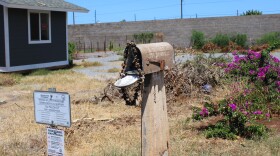The National Oceanic and Atmospheric Administration's Central Pacific Hurricane Center has predicted a 50% likelihood of an "above-normal" hurricane season. That could result in four to seven tropical cyclones appearing or passing through the region surrounding the state.
Cyclones can include tropical depressions, tropical storms and hurricanes.
"We do not predict in the outlook, how many systems will directly impact the state of Hawaiʻi," said Christopher Brenchley, director of the Central Pacific Hurricane Center.
"As we've been reminded in seasons past, and also geographically recently with the typhoon in Guam, is that it only takes [the] impact from one. So with the increase in activity in the basin, there's obviously going to be potential for more threats to land," Brenchley said.
Although these weather events can appear under the right conditions at any time of the year, they are more prevalent between June 1 and Nov. 30 — otherwise known as hurricane season.
Meanwhile, NOAA's outlook indicates a 35% chance for near-normal activity and a 15% chance for a below-normal season. According to the agency, a normal season has four or five cyclones.
However, ocean conditions in the Pacific are shifting toward warmer temperatures, typical of El Niño weather patterns. That usually generates more cyclone activity, NOAA warned.
"The last few hurricane seasons have been pretty quiet around Hawaiʻi, luring some folks to let their guard down," Brenchley said. "It's more important than ever to review your emergency plan and supply kit now, so you will be prepared for the next hurricane threat."
The elevated prediction and the impact of super Typhoon Mawar on Guam have meteorologists and government leaders urging residents to prepare for the upcoming season.
Residents are asked to prepare two weeks of food, water and medication in the event a storm occurs.
"Now that we're in the season: have 14 days of water, have food available for you, know where you will go ... These are very important things," Gov. Josh Green said at the press conference on Thursday.
In addition to preparing emergency kits, Green urged residents to take extra precautions when preparing. He cautioned that since the COVID-19 pandemic, the state is short of health care providers.
"It's even more important that we practice good prevention because, right now, our hospitals are pretty full. And God forbid we had any individuals get hurt or have consequences from not being able to take care of themselves," Green said.
For more information, click here.







